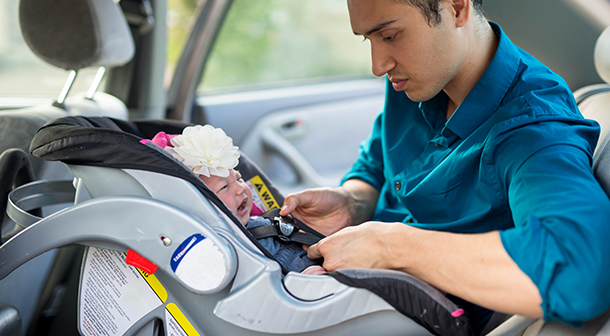10 Ways to Calm a Crying Baby
By GetParentingTips.com staff
Read Time: 7 Minutes
When Your Baby Won't Stop Crying
How do you calm a crying baby? New parents know all too well - hearing a fussy baby cry can be very stressful. Sometimes it may seem like your baby cries all the time. This can make you feel tired or angry, or you might even feel guilty for feeling so frustrated. That's normal.
The good news is that newborn crying is also normal. If your baby cries a lot in the first few months of life it's probably fine, assuming your baby has been checked by a doctor and is healthy. If your baby cries a lot it doesn't mean that you're a bad parent. All babies cry. It's not fun, but like everything in parenting, you can get through this. And you're not alone - most parents have felt this way before.
It can help to know that crying is an important way that newborns communicate their needs. Here are some ways you can respond to your infant crying to meet your his (or her) needs and calm your crying baby.

The Why Behind the Cry
The first thing to do is to try figure out the reason your infant is crying. First, check the common reasons your baby might be crying. Could it be that your baby is:
- Needing a clean diaper?
- Tired?
- Hungry?
- Overstimulated?
- Too hot or too cold?
- Uncomfortable?
- Gassy or needs to be burped more often?
There may be times when you have checked all of these things and your baby is still crying. This is hard for parents, but stay calm. Whatever you do, never shake your baby or take out your frustration on your baby. Shaking a baby can cause serious brain damage.
Make sure your baby is feeling okay and not running a fever. It's natural for a baby to cry, but if crying continues for a long period of time he could be sick.
Crying and Soothing Techniques You Can Use
Tips you can try today to help calm a crying baby.
Try holding your baby close to you.
Bonding and physical touch communicates love, warmth, and care, and helps your infant feel safe. Holding your baby may help calm him. Baby wearing in a sling or carrier can help keep your baby close for long periods of time. Swaddling can also help him feel secure.
Hum or "shush" calmly.
Shush calmly in your baby's ear, or hum a song. Do this with him held close to your chest so he can feel the vibration. The shushing simulates the sound of being in the womb, which is comforting to a baby
Use white noise or music.
Try creating white noise nearby, such as running a vacuum cleaner or a fan. There are many white noise apps available to download to your phone, and you can also buy a simple white noise machine. White noise machines are also helpful for achieving deeper REM sleep. Avoid machines with lots of lights - these can be distracting when baby is sleeping. Playing music or singing a song may also soothe your baby.
Swing, rock, or gently bounce.
Try rocking your baby softly in a rocking chair. Don't use pillows or blankets to pad your baby - these can cause an increased risk for SIDS or suffocation. If you don't have a chair, you can sway gently from side to side as you hold your baby.
Do the walk and pat.
Hold your baby close to you and walk with soft, bouncing steps. Pat your baby gently and slowly on the bottom or back. Try to make the walking and patting as steady and rhythmic as you can. Think of your hand as a heartbeat or sing a song (out loud or in your head) and pat along to the beat. If you start to feel upset or frustrated, you might stop this method and try something else. You don't want to pat your baby too hard.
Calming a Fussy Baby
Take a ride.
A short ride in the car or stroller provides a soothing motion that can sometimes calm a crying baby.

Try a warm bath or baby massage.
If your baby enjoys being in water, a warm bath may help calm a fussy baby at night. After the bath, try a gentle massage in a darkened room. Many babies prefer gentle squeezes - experiment to find what your little one likes. Your doctor can give you tips on the best way to massage your baby. A gentle massage can also help your baby pass gas.
Paci, please!
If your baby is more than a month old and is breastfeeding or taking a bottle well, try a pacifier. The sucking motion can be calming when your baby won't stop crying. Something as simple as a pacifier can help soothe your infant and help him relax. If you are breastfeeding, make sure that it's well established before introducing a pacifier. This helps avoid nipple confusion and ensures you don't miss hunger cues.
Walk outside.
Sometimes a change of scenery is all your baby needs to calm down. Try walking outside and letting your baby see new surroundings or hear birds chirping.
Try the reverse football hold.
The reverse football hold can be comforting for babies, especially if they are having gas pains. This position puts gentle pressure on baby's tummy, which can help get the gas out. Here is how it works:
- Try laying your baby on his stomach or side on your forearm, with his head toward your elbow.
- Use the palm of your hand to apply gentle pressure to your baby's tummy. You can hold onto your his for added stability.
- Use your other hand to gently rub and pat his back.
- Sway softly back and forth. This gentle rhythmic motion can help soothe your baby.

If you are nursing your baby, make sure you are not getting too much caffeine. Caffeine is a stimulant and can actually cause your baby to cry more and have a hard time falling asleep.
Be patient.
Every baby has their own soothing needs, and you might need to combine some of these to help your baby stop crying - try the stroller ride with the pacifier, for example. Whichever method you use, it's important to stick with the same calming action for several minutes before trying something different. If you switch between techniques too quickly, your baby is less likely to calm down. If you've tried one of the methods for a while and your baby continues to cry or becomes more upset, switch and try one of the other suggestions listed above. Calming your newborn takes time and patience. Babies prefer different things on different days, so don't be surprised if the same thing doesn't work every time.
Crying it Out
There may be times when none of these tips works and your baby still cries. As long as you know your baby isn't sick, it is okay to lay him safely in his crib. This will give him a chance to calm himself down and give you a break. Walk away, take deep breaths, or call a friend. It's normal to feel overwhelmed, and taking a few minutes for yourself is all right.
Never hit a baby.
If you cannot calm your baby or if you're feeling angry or overwhelmed by your baby's crying, it's okay to take a break. Place your baby in the crib on his back and step away. Remind yourself that your baby is not trying to upset you. It's okay for a baby to cry alone for a short time, so take a 10-15 minute break to calm down.
Never hit or shake your baby. This can cause long-term internal or brain injuries, or even death. As hard as it can be when your baby won't stop crying, stay calm. As your baby grows, this stage will pass.
Need parenting help now?
The Texas Parent Helpline is available 24/7.
- Call 833-680-0611
- Chat with us
- Text 833-680-0611
What if the crying goes on for hours?
Sometimes infants cry for long periods of time for no reason, and crying bouts tend to go in phases. If you've tried everything and checked all the expected stuff, make sure your child is not sick or injured. Remember, having a baby that cries a lot won't go on forever. As your babies get older, they get better at letting you know their needs.
Does my baby have colic?
Some babies have colic, which is uncontrollable crying in a healthy baby. Your baby may cry for no reason, and some babies with colic actually scream or cry as if in pain. Many newborns have colic and will usually outgrow it by three months of age. However, it's important to talk to your child's doctor if your baby is extremely fussy and you think he may have colic. If your baby is colicky, try the tips above to find ways to comfort him.
Get help.
You don't have to do this by yourself. If you're feeling frustrated or overwhelmed, get help from your partner, family, or friends, or call a help line. They might have some good suggestions to help calm your crying baby. If nothing else, talking with someone can help remind you that you're not alone, and that many parents face this same struggle.
Adapted from UC Davis Human Lactation Center's Baby Behaviors curriculum.
Fussy Babies Tips Sheet
Download and print Fussy Baby, a tip sheet. Post it on your refrigerator or a convenient place to remind you of ways to help calm your baby.




